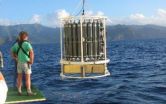(Press-News.org) Adding a missing protein to infertile human sperm can 'kick-start' its ability to fertilise an egg and dramatically increase the chances of a successful pregnancy, a team of Cardiff University scientists have uncovered.
The team from Cardiff University's School of Medicine first found that sperm transfers a vital protein, known as PLC-zeta (PLCz), to the egg upon fertilisation. This sperm protein initiates a process called 'egg activation' which sets off all the biological processes necessary for development of an embryo.
Now, the team has found that eggs that don't fertilise because of a defective PLCz, as in some forms of male infertility, can be treated with the active protein to produce egg activation. The added PLCz kick-starts the fertilisation process and significantly improves the chance of a successful pregnancy.
"We know that some men are infertile because their sperm fail to activate eggs. Even though their sperm fuses with the egg, nothing happens. These sperm may lack a proper functioning version of PLCz, which is essential to trigger the next stage in becoming pregnant," said Professor Tony Lai, who together with Professor Karl Swann led the research team at Cardiff University's Institute of Molecular and Experimental Medicine.
"What's important from our research is that we have used human sperm PLCz to obtain the positive results that we had previously observed only in experiments with mice.
"In the lab we have been able to prepare human PLCz protein that is active. If this protein is inactive or missing from sperm, it fails to trigger the process necessary for egg activation - the next crucial stage of embryo development.
"However, when an unfertilised egg is injected with human PLCz, it responds exactly as it should do at fertilisation, resulting in successful embryo development to the blastocyst stage, vital to pregnancy success," he added.
Published online by the journal Fertility and Sterility (Friday 21st September, 2012) and funded by the Wellcome Trust, the work strengthens the potential use of PLCz in treating male infertility.
Professor Tony Lai adds: "We've established that this one sperm protein, PLCz, is absolutely critical at the point where life begins.
"Whilst this was a lab experiment and our method could not be used in a fertility clinic in exactly the same way – there is potential to translate this advance into humans.
"In the future, we could produce the human PLCz protein and use it to stimulate egg activation in a completely natural way. For those couples going through IVF treatment, it could ultimately improve their chances of having a baby and treat male infertility."
###
Notes:
'Phospholipase C rescues failed oocyte activation in a prototype of male factor infertility' by Nomikos M. et al., Fertility and Sterility, will be published online: 17.05 (GMT) Friday 21st September, 2012.
For further information or to arrange a media interview, please contact:
Professor F. Anthony Lai
Institute of Molecular and Experimental Medicine
Cardiff University School of Medicine
Heath Park
Tel: 029 20742613
E-mail: LaiT@cf.ac.uk
Or
Chris Jones
Public Relations
Cardiff University
Tel: 029 20 874731
E-mail: jonesc83@cardiff.ac.uk
Cardiff University
Cardiff University is recognised in independent government assessments as one of Britain's leading teaching and research universities and is a member of the Russell Group of the UK's most research intensive universities. Among its academic staff are two Nobel Laureates, including the winner of the 2007 Nobel Prize for Medicine, University President Professor Sir Martin Evans.
Founded by Royal Charter in 1883, today the University combines impressive modern facilities and a dynamic approach to teaching and research. The University's breadth of expertise in research and research-led teaching encompasses: the humanities; the natural, physical, health, life and social sciences; engineering and technology; preparation for a wide range of professions; and a longstanding commitment to lifelong learning.
Three major new Research Institutes, offering radical new approaches to neurosciences and mental health, cancer stem cells and sustainable places were announced by the University in 2010.
www.cardiff.ac.uk
'Kick-starting' male fertility
2012-09-21
ELSE PRESS RELEASES FROM THIS DATE:
Nunavut's mysterious ancient life could return by 2100
2012-09-21
This press release is available in French.Global climate change means that recently discovered ancient forests in Canada's extreme north could one day return, according to Alexandre Guertin-Pasquier of the University of Montreal's Department of Geography, who is presenting his findings at the Canadian Paleontology Conference in Toronto today. "According to the data model, climate conditions on Bylot Island will be able to support the kinds of trees we find in the fossilized forest that currently exist there, such as willow, pine and spruce. I've also found evidence of ...
Nudge or think: What works best for our society?
2012-09-21
If approached in the right way, citizens are willing to change their behaviour and do more to help themselves and others, according to research funded by the Economic and Social Research Council (ESRC). The project, carried out jointly at the universities of Manchester and Southampton, experimented with different interventions techniqueswhich encourage citizen participation and explored people's motivations for community involvement.
The researchers focused on comparing the effectiveness of 'nudge' techniques, where people are offered incentives to change their behaviour, ...
Research blog: An expedition to the Earth's fiery heart
2012-09-21
Volcanic activity on and around La Réunion is driven by a localized upwelling of hot buoyant magma. Unlike most magma sources, this is not located on the boundary between two tectonic plates, and rises from much greater depths. It is a so-called hotspot, and has left behind on the overlying mobile crust a track of volcanic activity that stretches 5500 km northwards to the Deccan Plateau in India. Some 65 million years ago, in a process that had a massive impact on world climate, the Deccan area was covered with enormous amounts of lava as the Indian Plate passed over the ...
New challenges for ex-Olympians
2012-09-21
When elite-level athletes retire, they often struggle to adapt to their new lives. When finding that the characteristics that were valuable in sport are not equally useful in 'ordinary' life, they often start experiencing disorientation, depression, self-doubt or even illness. This is concluded in research from the University of Gothenburg.
Successful athletes at the elite level develop characteristics that should generate success also later in life. However, this notion may be wrong, according to the new research.
As part of a study, ex-Olympians from Sweden, Switzerland, ...
23 nuclear power plants are in tsunami risk areas
2012-09-21
The tsunami in Japan in March 2011 unleashed a series of negligence related with the resulting nuclear disaster. A scientific study headed by Spanish researchers has for the first time identified those atomic power plants that are more prone to suffering the effects of a tsunami. In total, 23 plants are in dangerous areas, including Fukushima I, with 74 reactors located in the east and southeast of Asia.
Tsunamis are synonymous with the destruction of cities and homes and since the Japanese coast was devastated in March 2011 we now know that they cause nuclear disaster, ...
Remarkable enzyme points the way to reducing nitric acid use in industry
2012-09-21
An enzyme in the bacterium that causes potato scab could help create new, environmentally-benign biocatalysts with the potential to cut use of the highly corrosive chemical nitric acid.
Chemists at the University of Warwick in the UK, in collaboration with researchers at Cornell University in the USA, have reported in the journal Nature Chemical Biology the discovery of an enzyme in the bacterium Streptomyces scabies that catalyses an aromatic nitration reaction.
TxtE, a cytochrome P450 enzyme, is the first example of an enzyme that has specifically evolved to catalyse ...
Swedish journalists to the left of the public and elected politicians
2012-09-21
On the political scale, Swedish journalists can be placed to the left of the Swedish public and their elected politicians. And the distance between the two sides has increased significantly in recent decades, although this is more due to the public and politicians having moved to the right than to journalists having moved to the left. These are the results of a study conducted at the University of Gothenburg, Sweden.
'The transition of journalists farther and farther to the left on the political scale stagnated in the mid-1990s,' says Professor Kent Asp, who headed the ...
Money key factor in driving med students from primary care careers
2012-09-21
Primary care physicians are at the heart of health care in the United States, and are often the first to diagnose patients and ensure those patients receive the care they need. But researchers from North Carolina State University, East Carolina University (ECU) and the Albert Einstein College of Medicine of Yeshiva University in New York have found that many students are choosing to pass up a career in primary care because those physicians make substantially less money than specialists, such as dermatologists or radiologists.
"We found that students who placed a premium ...
Obama leads in Michigan; many voters undecided
2012-09-21
EAST LANSING, Mich. — President Barack Obama holds a substantial lead in Michigan over Republican challenger Mitt Romney, although many of the state's voters remain undecided, according to Michigan State University's latest State of the State Survey.
In the quarterly survey, completed in August, the Democratic incumbent leads Romney 39 percent to 30 percent among likely voters, for a margin of 9 percentage points. The results come on the heels of an EPIC-MRA poll for the Detroit Free Press and a Detroit News/WDIV Local 4 survey that both show Obama with a commanding lead.
The ...
Unusual symbiosis discovered in marine microorganisms
2012-09-21
Scientists have discovered an unusual symbiosis between tiny single-celled algae and highly specialized bacteria in the ocean.
The partnership plays an important role in fertilizing the oceans by taking nitrogen from the atmosphere and "fixing" it into a form that other organisms can use.
Details of the finding, published in this week's issue of the journal Science, emerged from the investigation of a mysterious nitrogen-fixing microbe that has a very small genome.
First detected in 1998 by Jonathan Zehr, a marine scientist at the University of California, Santa ...



